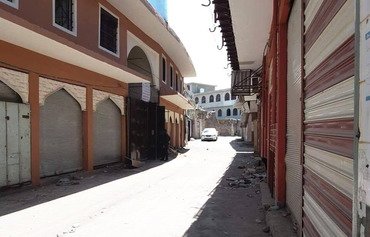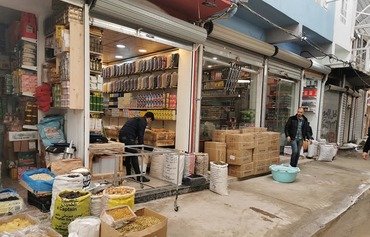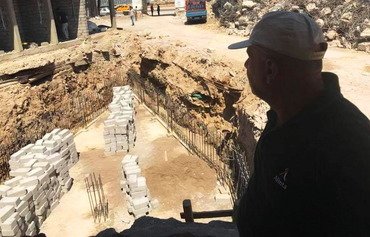A reopened teahouse, standing amid the rubble of leveled houses and fallen buildings in west Mosul, is a sign -- however small -- that the city is coming back to life, however slow progress may seem.
Hamoudi's teahouse, "Ritage", in Mosul's al-Dawasa neighbourhood is the first cafe to reopen in the area since Prime Minister Haider al-Abbadi arrived in the city in July to announce victory over the "Islamic State of Iraq and Syria" (ISIS).
The cafe's reopening, celebrated on social media by local activists, is seen by some as an act of defiance in the face of the challenges that Mosul must overcome.
At the same time as the teahouse owner started serving customers again, a street vendor began selling hot chickpeas from his food cart nearby.
"The residents of Mosul cannot wait until government support and financial compensation arrive, so they have taken it upon themselves to rebuild their affected shops and markets," Mosul governor Zuhair al-Araji told Diyaruna.
Grassroots initiative
Shop owners in western Mosul's al-Ghazi Street and Khaled bin al-Waleed Street decided to start a reconstruction fund, and began collecting donations according to their means, al-Araji said.
Individual contributions ranged from 10,000 Iraqi dinars ($8.50) to 100,000 dinars ($84.50), he said.
When the project took off and merchants started rebuilding their shops, shop owners in other marketplaces also started collecting money to rebuild in areas such as Bab al-Saray, the stock exchange, Bab Jedid and Ras al-Jada, he said.
Shop owners took "before" and "after" photos of their shops to show the level of transformation, and sent them to the authorities in order to claim damages at such a time as the government releases the allocated funds.
The local authority in Mosul has provided logistical support to this initiative, albeit in a limited capacity, al-Araji said.
The municipality, Civil Defence and police provided vehicles to remove the rubble and opened roads, he said, and they also provided water and electricity.
Heavy damage in some areas
Municipal efforts were commensurate with the level of destruction, al-Araji said, noting that certain areas in Mosul can be classified as severely damaged.
Among them is the Old City, he said, noting that in half of the area, residential units were completely destroyed and cannot be rebuilt by their owners without assistance.
In the other half of the Old City, between 25 and 75% of the buildings were destroyed, he said, and this is where life is slowly returning to normal, with new reconstruction projects under way to encourage residents to return.
Lt. Col. Rabih Ibrahim, a rescue officer at the Civil Defence Directorate in Mosul, told Diyaruna his staff have removed debris and cleared explosives from roads to the best of their ability.
Civil defence teams have been working hard to bring life back to the western side of Mosul, he said, and are rapidly responding to reports from residents who moved back about any suspicious situation.
Ninawa provincial council member Ghazwan Dawoodi told Diyaruna the federal government must urgently release compensation funds so reconstruction can commence and civilians no longer need to rely on themselves to do the job.
Ninawa cannot meet these demands alone, he said, even working at full capacity and in collaboration with international organisations to provide basic services such as water, electricity, education and healthcare.

![Iraqi police and business owners mingle at al-Saray Market in Mosul after the ouster of the 'Islamic State of Iraq and Syria'. [Photo courtesy of Ninawa Media Centre Facebook page]](/cnmi_di/images/2018/03/07/11728-mosul-shops-back-600_384.jpg)






